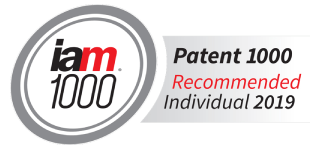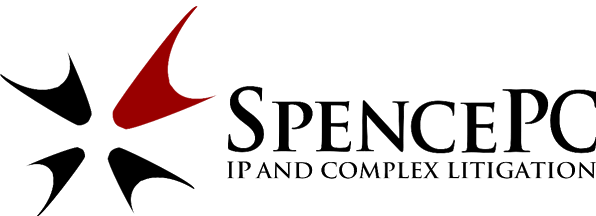Services
Practice Areas
Why SpencePC?
Clients choose SpencePC because we do outstanding work for fair compensation. Unlike our competitors, we encourage the use of alternative-fee agreements that more closely align our clients’ interests with the Firm’s interests. As a result, our clients pay only for the value they receive.
Our Philosophy
Our philosophy is simple: be outstanding and offer a unique value proposition. Hourly billing creates the wrong incentive for attorneys to work longer, not smarter. Instead, we encourage alternative-fee arrangements that reward success and efficiency. By doing so, our attorneys remain focused on obtaining the best results for our clients in the most cost-efficient manner.
Our Skills
We are attorneys who specialize in intellectual property and complex litigation. We hold science, engineering, and law degrees from the nation’s top schools. Following our education, each of us received years of additional training from prestigious, top-tier law firms. Our billing model ensures we remain focused on obtaining the best results in the most cost-efficient manner.
Associations & Accolades
Enforcing Your Trademark Rights against Counterfeiters and Competitors in the world of E-Commerce
By: AJ Wenn & Danny Hess
While the ripple effects of the COVID-19 pandemic have many businesses tightening their budgets, the exact opposite is true in the e-commerce sector. Traditional retail business restrictions and shelter-in-place orders have sent the e-commerce market soaring. In a blog post on March 16, 2020 Amazon revealed that it is opening 100,000 new full and part-time positions to manage the surge in online shopping. Data from the U.S. Census Bureau demonstrates that e-commerce sales for January and February 2020 were the highest ever recorded. With such rapid growth comes a resurgence of dubious opportunists hoping to benefit from counterfeit and other fraudulent scams related to the online sale of goods. The shortage of genuine products creates a unique opportunity for counterfeits across online marketplaces targeting consumers who cannot wait for suppliers of genuine products to restock. For brands seeking to protect themselves against the estimated $509 billion trade in counterfeits and fakes, now is the time to implement a comprehensive strategy to combat these dubious trade practices.
Trademark law can assist your company in protecting your own brand from counterfeits while other competition and consumer protection laws may assist your business in taking an even more offensive approach: cracking down on false advertising and other harmful e-commerce practices. SpencePC’s attorneys are experienced in a wide variety of matters related to trademark enforcement and counterfeit protection and prepared to assist you in finding effective resolutions.
The most important step your business can take to protect its brand and reputation is to secure an enforceable trademark. This is done by filing with the United States Patent and Trademark Office or through common law by sufficiently “using” your trademark consistently in the stream of commerce. If you have any questions regarding trademark registration or enforceability, SpencePC is prepared to assist you. Unlike most other forms of intellectual property, you must consistently use and enforce your trademark in order to keep your legal rights to it. The longer your business allows counterfeit, potential infringers, or competitors to co-opt your business’s trademark the more likely a court of law could find the trademark to have been abandoned by its rightful owner.
The growth of e-commerce provides counterfeiters and trademark infringers an easy platform to sell knock-off products that harm your businesses bottom line or damage your company brand. Filing trademark infringement and counterfeit lawsuits in State and Federal Court is (perhaps surprisingly) a low-cost steady enforcement strategy your business can utilize. Most e-commerce sales occur on only a handful of online marketplaces (e.g. Amazon, eBay, Alibaba). While there may be hundreds of potential counterfeiters amongst the users of these marketplaces, they all can typically be joined in a single action—saving you both time and money. A large majority of these account holders never respond to the Court Summons sent to their accounts and therefore the Court typically will enter a “default judgement” against them, granting your business all the relief it requested. Your business would receive a court order to shut down the infringing accounts and claim any funds that the counterfeiting users had in their accounts. Thankfully, these online marketplaces are typically very cooperative in this process. While this enforcement method may not end all counterfeit, it is a cheap and efficient way to ensure your business is not taken advantage of in the e-commerce marketplace. Additionally, collecting on the seized funds from these counterfeiter’s e-commerce accounts can offset your legal costs and even become a profitable revenue stream.
Legal counsel can be invaluable in ensuring your business can successfully enforce or defend against the actions of counterfeiters and competitors in e-commerce marketplaces. If you have any questions regarding trademark enforcement or unfair competitive acts by counterfeiters or competitors, please feel free to contact SpencePC.
1. Daniel Bennett, Covid-19 and Counterfeiting: How the Pandemic is Reshaping Brand Protection – Part 1, CORSEARCH (last visited June 8, 2020), https://corsearch.com/covid-19-counterfeiting-how-pandemic-reshaping-brand-protection/.
2. Id.
3. Id.
The post Enforcing Your Trademark Rights against Counterfeiters and Competitors in the world of E-Commerce appeared first on SpencePC.











